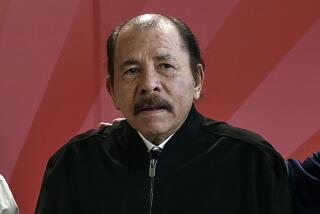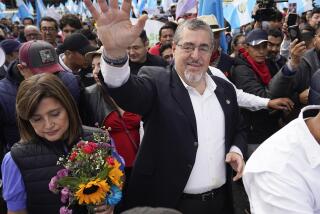OAS Criticizes Noriega, Fails to Demand Ouster
- Share via
WASHINGTON — The Organization of American States adopted a resolution Wednesday criticizing Panamanian strongman Manuel A. Noriega and calling for steps toward “a transfer of power” in Panama--but the action fell short of what the United States had wanted, an outright demand for Noriega’s ouster.
Secretary of State James A. Baker III lobbied discreetly for a stronger text, but the Latin traditions of consensus and noninterventionism stood in the way, diplomats at the 32-nation body said.
The resolution was approved unanimously, although Panama and Nicaragua earlier opposed it in a 27-2 vote on the draft that emerged from hours of closed-door debate.
The resolution condemned “abuses by Noriega” that, it said, “could unleash an escalation of violence.” But it did not call directly for Noriega to relinquish power or recognize the opposition as the winners of this month’s elections, both formulas U.S. officials had hoped would be possible.
The wording was sufficiently conciliatory that Noriega’s foreign minister, Jorge Ritter, agreed to vote in favor of the resolution’s final passage “so there will be consensus in the Latin American community.”
Nevertheless, Baker said he considers the outcome satisfactory. “This resolution directly names Noriega for the grave abuses,” he said. “We are pleased with this resolution.”
Juan B. Sosa, the Panamanian ambassador to Washington who broke with Noriega last year and now represents the opposition, called it “very, very positive.”
The special session of the OAS, which includes almost every country in the Western Hemisphere, was called at Venezuela’s request to consider actions to end the crisis in Panama.
Many of the organization’s members have already condemned Noriega’s regime for attempting to steal Panama’s elections, annulling the results and sending thugs to attack opposition leaders.
But Wednesday’s resolution, originally submitted by 10 Latin countries led by Venezuela and Peru, was much milder in tone.
Special Mission
In its main concrete action, the resolution sets up a special mission of three OAS foreign ministers to mediate between Panama’s government and the opposition “to arrive at a national accord which can secure a transfer of power, through democratic means and in the shortest possible time, with full respect for the sovereign will of the Panamanian people.”
The session was adjourned until June 6, when it is scheduled to resume to hear a report on the OAS delegation’s work in Panama.
The OAS members did strengthen the wording of their statement in one respect--to mention Noriega by name. The original draft did not refer to the dictator at all, but El Salvador, supported by the United States, offered an amendment that notes: “The grave events and abuses by Gen. Manuel Antonio Noriega . . . could unleash an escalation of violence, with consequent risks to the life and integrity of persons.”
The resolution also condemned “the outrageous abuses perpetrated against the opposition candidates and citizens.”
The decision to mention Noriega by name was made by a 20-2 vote, with Panama and Nicaragua opposed and seven countries abstaining.
“We consider this a very strong statement,” said Bernard Aronson, Baker’s nominee as assistant secretary of state for Latin America. “It identifies him by name as having caused the crisis.” He said it “will certainly be interpreted in Panama as saying that Noriega has to go.”
Latin American diplomats said they will attempt to use the resolution as the basis for a new attempt to wheedle Noriega into retirement.
Venezuelan President Carlos Andres Perez, one of the resolution’s sponsors, said earlier that he intended to seek a diplomatic path to force Noriega out. “A Panamanian solution is incompatible with Noriega in power,” he said.
Venezuelan officials said Perez believes that after the widespread condemnation of Noriega’s actions in Latin America, the military strongman might be persuaded to call new elections to provide himself a graceful exit.
Other Latin American diplomats noted that their political pressure on Noriega has been reinforced by the implicit threat of military intervention by the United States, embodied by the 2,000 troops President Bush ordered to Panama.
Peru’s foreign minister, Guillermo Larco, opened the debate by warning that unless the OAS took action, the alternative would be “intervention by the strongest power,” the United States.
Bush had telephoned several Latin leaders to urge them to act against Noriega.
More to Read
Sign up for Essential California
The most important California stories and recommendations in your inbox every morning.
You may occasionally receive promotional content from the Los Angeles Times.














